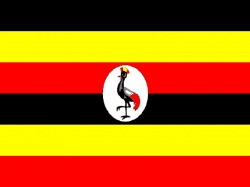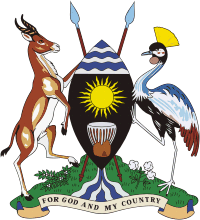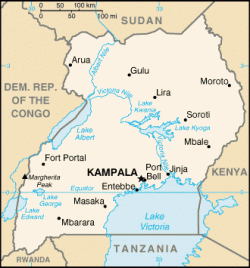Information on this page is fathered from the CIA Factbook - Uganda.
The Ugandan National Anthem
Oh Uganda may God uphold thee,
We lay our future in thy hand,
United free for liberty
Together we'll always stand.
Oh Uganda the land of freedom,
Our love and labour we give,
And with neighbours all,
At our country's call
In peace and friendship we'll live.
Oh Uganda! the land that feeds us,
By sun and fertile soil grown,
For our own dear land,
We shall always stand,
The pearl of Africa's Crown.
Oh Uganda may God uphold thee,
We lay our future in thy hand,
United free for liberty
Together we'll always stand.
Oh Uganda the land of freedom,
Our love and labour we give,
And with neighbours all,
At our country's call
In peace and friendship we'll live.
Oh Uganda! the land that feeds us,
By sun and fertile soil grown,
For our own dear land,
We shall always stand,
The pearl of Africa's Crown.
Background
The colonial boundaries created by Britain to delimit Uganda grouped together a wide range of ethnic groups with different political systems and cultures. These differences prevented the establishment of a working political community after independence was achieved in 1962. The dictatorial regime of Idi Amin (1971-79) was responsible for the deaths or some 300,000 opponents; guerrilla war and human rights abuses under Milton Obote (1980-85) claimed at least another 100,000 lives. The rule of Yoweri Museveni since 1986 has brought relative stability and economic growth to Uganda. During the 1990s, the government promulgated non-party presidential and legislative elections. In January 2009, Uganda assumed a non permanent seat in the UN Security Council for the of 2009-10 term.
Basic Facts
- Capital: Kampala
- independence Day: October 9th, 1962 (from the UK)
- Location: Eastern Africa, west of Kenya
- Size: Slightly smaller than the state of Oregon
Climate
- Tropical; generally rainy with two dry seasons (December to February, June to August)
- semiarid in northeast
Natural Resources
- Copper
- Cobalt
- Hydropower
- Limestone
- Salt
- Arable Land
Economy
Uganda has substantial natural resources, including fertile soils, regular rainfall, and sizable mineral deposits of copper, cobalt, gold, and other minerals. Agriculture is the most important sector of the economy, employing over 80% of the work force. Coffee accounts for the bulk of export revenues. Since 1986, the government - with the support of foreign countries and international agencies - has acted to rehabilitate and stabilize the economy by undertaking currency reform, raising producer prices on export crops, increasing prices of petroleum products, and improving civil service wages. The policy changes are especially aimed at dampening inflation and boosting production and export earning. During 19990-2001, the economy turned in a solid performance based on continued investment in the rehabilitation of infrastructure, improved incentives for production and exports, reduced inflation, gradually improved domestic security and the return of exiled Indian-Ugandan entrepreneurs. Growth continues to be solid, despite variability in the price of coffee, Uganda's principal export, and a consistent upturn in Uganda's export markets. In 2000, Uganda qualified for enhanced Highly Indebted Poor Countries (HIPC) debt relief worth $1.3 billion and Paris Club debt relief worth $145 million. These amounts combines with the original HIPC debt relief add up to about $2 billion.
People
- Population: 32,369,58
- 50% of the population is under the age of 15, making Uganda the youngest coutry in the world
- People living with HIV/AIDS: 940,000 (2007 estimate)
Religion
- Roman Catholic: 41.9%
- Protestant: 42%
- Muslim:12.1%
- Other: 3.1%
- None: 0.9%
Languages
- English (official national language, taught in grade schools, used in court of law and by most newspapera and some radio broadcasts)
- Ganda or Luganda (most widely used of the Niger0Congo languages, preferred for native language publications in the capital and may be taught in school)
- Other Niger-Congo languages
- Swahili
- Arabic



